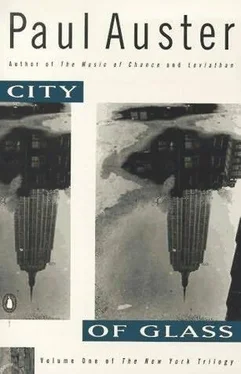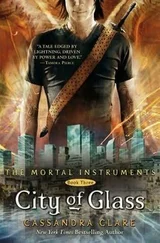Paul Auster - City of Glass
Здесь есть возможность читать онлайн «Paul Auster - City of Glass» весь текст электронной книги совершенно бесплатно (целиком полную версию без сокращений). В некоторых случаях можно слушать аудио, скачать через торрент в формате fb2 и присутствует краткое содержание. Жанр: Современная проза, на английском языке. Описание произведения, (предисловие) а так же отзывы посетителей доступны на портале библиотеки ЛибКат.
- Название:City of Glass
- Автор:
- Жанр:
- Год:неизвестен
- ISBN:нет данных
- Рейтинг книги:5 / 5. Голосов: 1
-
Избранное:Добавить в избранное
- Отзывы:
-
Ваша оценка:
- 100
- 1
- 2
- 3
- 4
- 5
City of Glass: краткое содержание, описание и аннотация
Предлагаем к чтению аннотацию, описание, краткое содержание или предисловие (зависит от того, что написал сам автор книги «City of Glass»). Если вы не нашли необходимую информацию о книге — напишите в комментариях, мы постараемся отыскать её.
City of Glass — читать онлайн бесплатно полную книгу (весь текст) целиком
Ниже представлен текст книги, разбитый по страницам. Система сохранения места последней прочитанной страницы, позволяет с удобством читать онлайн бесплатно книгу «City of Glass», без необходимости каждый раз заново искать на чём Вы остановились. Поставьте закладку, и сможете в любой момент перейти на страницу, на которой закончили чтение.
Интервал:
Закладка:
Quinn went back to the living room and sat down in a chair. He saw a half-smoked cigarette with lipstick on it in an ashtray. He lit it up and smoked it. Then he went into the kitchen, opened the refrigerator, and found some orange juice and a loaf of bread. He drank the juice, ate three slices of bread, and then returned to the living room, where he sat down in the chair -again. Fifteen minutes later he heard footsteps coming up the stairs, a jangling of keys outside the door, and then the girl from the photograph entered the apartment. She was wearing a white nurse's uniform and held a brown grocery bag in her arms. When she saw Quinn, she dropped the bag and screamed. Or else she screamed first and then dropped the bag. Quinn could never be sure which. The bag ripped open when it hit the floor, and milk gurgled in a white path toward the edge of the rug.
Quinn stood up, raised his hand in a gesture of peace, and told her not to worry. He wasn't going to hurt her. The only thing he wanted to know was why she was living in his apartment. He took the key from his pocket and held it up in the air, as if to prove his good intentions. It took him a while to convince her, but at last her panic subsided.
That did not mean she had begun to trust him or that she was any less afraid. She hung by the open door, ready to make a dash for it at the first sign of trouble. Quinn held his distance, not wanting to make things worse. His mouth kept talking, explaining again and again that she was living in his house. She clearly did not believe one word of it, but she listened in order to humor him, no doubt hoping that he would talk himself out and finally leave.
"I've been living here for a 'month," she said. "It's my apartment. I signed a year's lease."
"But why do I have the key?" Quinn asked for the seventh or eighth time. "Doesn't that convince you?"
"There are hundreds of ways you could have got that key."
"Didn't they tell you there was someone living here when you rented the place?"
"They said it was a writer. But he disappeared, hadn't paid his rent in months."
"That's me!" shouted Quinn. "I'm the writer!"
The girl looked him over coldly and laughed. "A writer? That's the funniest thing I ever heard. Just look at you. I've never seen a bigger mess in all my life."
"I've had some difficulties lately," muttered Quinn, by way of explanation. "But it's only temporary."
"The landlord told me he was glad to get rid of you anyway. He doesn't like tenants who don't have jobs, They use too much heat and run down the fixtures."
"Do you know what happened to my things?"
"What things?"
"My books. My furniture. My papers."
"I have no idea. They probably sold what they could and threw the rest away. Everything was cleared out before I moved in."
Quinn let out a deep sigh. He had come to the end of himself. He could feel it now, as though a great truth had finally dawned in him. There was nothing left.
"Do you realize what this means?" he asked.
"Frankly, I don't care," the girl said. "It's your problem, not mine. I just want you to get out of here. Right now. This is my place, and I want you out. If you don't leave, I'm going to call the police and have you arrested."
It didn't matter anymore. He could stand there arguing with the girl for the rest of the day, and still he wouldn't get his apartment back. It was gone, he was gone,. everything was gone. He stammered something inaudible, excused himself for taking up her time, and walked past her out the door.
13
BECAUSE it no longer mattered to him what happened, Quinn was not surprised that the front door at 69th Street opened without a key. Nor was he surprised when he reached the ninth floor and walked down the corridor to the Stillmans' apartment that that door should be open as well. Least of all did it surprise him to find the apartment empty. The place had been stripped bare, and the rooms now held nothing. Each one was identical to every other: a wooden floor and four white walls. This made no particular impression on Quinn. He was exhausted, and the only thing he could think of was closing his eyes.
He went to one of the rooms at the back of the apartment, a small space that measured no more than ten feet by six feet. It had one wire-mesh window that gave on to a view of the airshaft, and of all the rooms it seemed to be the darkest. Within this room there was a second door, which led to a windowless cubicle that contained a toilet and a sink. Quinn put the red notebook on the floor, removed the deaf mute's pen from his pocket, and tossed it onto the red notebook. Then he took off his watch and put it in his pocket., After that he took off all his clothes, opened the window, and one by one dropped each thing down the airshaft: first his right shoe, then his left shoe; one sock, then the other sock; his shirt, his jacket, his underpants, his pants. He did not look out to watch them fall, nor did he check to see where they landed. Then he closed the window, lay down in the center of the floor, and went to sleep.
It was dark in the room when he woke up. Quinn could not be sure how much time had passed-whether it was the night of that day or the night of the next. It was even possible, he thought, that it was not night at all. Perhaps it was merely dark inside the room, and outside, beyond the window, the sun was shining. For several moments he considered getting up and going to the window to see, but then he decided it did not matter. If it was not night now, he thought, then night would come later. That was certain, and whether he looked out the window or not, the answer would be the same. On the other hand, if it was in fact night here in New York, then surely the sun was shining somewhere else. In China, for example, it was no doubt mid-afternoon, and the rice farmers were mopping sweat from their brows. Night and day were no more than relative terms; they did not refer to an absolute condition. At any- given moment, it was always both. The only reason we did not know it was because we could not be in two places at the same time.
Quinn also considered getting up and going to another room, but then he realized that he was quite happy where he was. It was comfortable here in the spot he had chosen, and he found that he enjoyed lying on his back with his eyes open, looking up at the ceiling-or what would have been the ceiling, had he been able to see it. Only one thing was lacking for him, and that was the sky. He realized that he missed having it overhead, after so many days and nights spent in the open. But he was inside now, and no matter what room he chose to camp in, the sky would remain hidden, inaccessible even at the farthest limit of sight.
He thought he would stay there until he no longer could. There would be water from the sink to quench his thirst, and that would buy him some time. Eventually, he would get hungry and have to eat. But he had been working for so long now at wanting so little that he knew this moment was still several days off. He decided not to think about it until he had to. There was no sense in worrying, he thought, no sense in troubling himself with things that did not matter.
He tried to think about the life he had lived before the story began. This caused many difficulties, for it seemed so remote to him now. He remembered the books he had written under the name of William Wilson. It was strange, he thought, that he had done that, and he wondered now why he had. In his heart, he realized that Max Work was dead. He had died somewhere on the way Ito his next case, and Quinn could not bring himself to feel sorry. It all seemed so unimportant now. He thought back to his desk and the thousands of words he had written there. He thought back to the man who had been his agent and realized he could not remember his name. So many things were disappearing now, it was difficult to keep track of them. Quinn tried to work his way through the Mets' lineup, position by position, but his mind was beginning to wander. The centerfielder, he remembered, was Wilson, a promising young player whose real name was William Wilson. Surely there was something interesting in that; Quinn pursued the idea for a few moments but then abandoned it. The two William Wilsons cancelled each other out, and that was that. Quinn waved good-bye to them in his mind. The Mets would finish in last place again, and no one would suffer.
Читать дальшеИнтервал:
Закладка:
Похожие книги на «City of Glass»
Представляем Вашему вниманию похожие книги на «City of Glass» списком для выбора. Мы отобрали схожую по названию и смыслу литературу в надежде предоставить читателям больше вариантов отыскать новые, интересные, ещё непрочитанные произведения.
Обсуждение, отзывы о книге «City of Glass» и просто собственные мнения читателей. Оставьте ваши комментарии, напишите, что Вы думаете о произведении, его смысле или главных героях. Укажите что конкретно понравилось, а что нет, и почему Вы так считаете.












